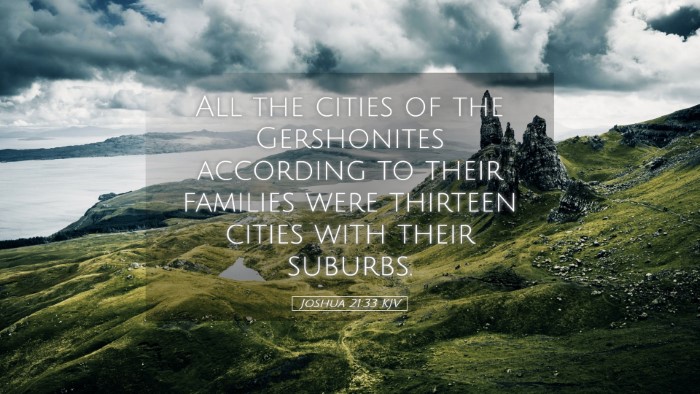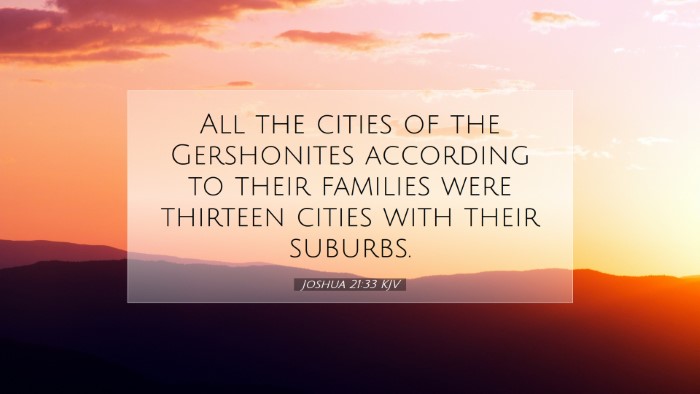Commentary on Joshua 21:33
Verse: Joshua 21:33 - "And the rest of the children of Merari were by their families, and the tribe of Zebulun, and the town of their possessions, and the country belonging to them: twelve cities."
Introduction
This verse concludes the account of the Levitical cities, specifically reflecting on the inheritance of the Merarites, one of the groups among the Levites. The Levites, set apart for the service of the Lord, were given cities rather than a distinct territorial inheritance like the other tribes. This commentary synthesizes insights from different public domain sources, offering a comprehensive understanding.
Background Context
The Book of Joshua provides a historical narrative of the Israelites' conquest and settlement of Canaan. Chapter 21 details the cities allocated to the Levites, emphasizing their unique role in the community. The Levites were responsible for the temple service and religious duties, and their cities served as places for administering the law and guiding the worship of Yahweh.
Insights from Commentaries
-
Matthew Henry:
Henry notes that the distribution of cities to the Levites symbolizes the spiritual heritage of the people of God. It is a reminder that God provides for those dedicated to His service. The mention of the tribe of Zebulun indicates the collaborative spirit between the tribes in fulfilling God's command, showcasing a unity that is essential for the growth of the faith community.
-
Albert Barnes:
Barnes emphasizes that the specific mention of the "children of Merari" points to the careful considerations made in the division of land. The Merarites, being the least in number among the Levite families, received their inheritance in a way that reflects God's precise planning and provision for all His people. This act serves not only practical needs but also signifies the importance of every tribe's unique contribution to the Israelite society.
-
Adam Clarke:
Clarke elaborates on the significance of the twelve cities given to the Merarites. He highlights that each city represents a beacon of God’s presence and a place for priestly duties. Moreover, it sets an example of how all members of the community play an integral role. Clarke also points out that this allocation of cities demonstrates divine order, reinforcing the idea that God is a God of arrangement and distribution, ensuring no one is overlooked.
Theological Implications
The theological themes present in Joshua 21:33 include the provision of God, the significance of the Levitical order, and the importance of community and cooperation within the body of believers. It speaks to the broader narrative of God's faithfulness in guiding His people and ensuring their spiritual needs are met through dedicated servants.
Practical Applications
This verse can inspire believers today to recognize their own roles within their communities of faith. Just as the Levites were given cities to serve both God and the people, contemporary Christians are called to serve within their communities, contributing to the holistic health of their congregations through their unique gifts and callings.
Moreover, it affirms the necessity of organizing and understanding the roles within the church structure. As pastors and leaders, the distribution of responsibilities should aim for spiritual growth, mutual support, and unity, mirroring the cooperative spirit illustrated in the allocation of cities to the Merarites.
Conclusion
Joshua 21:33 serves as a valuable reminder of God's providence and the vital role of each community member in advancing the kingdom of God. By understanding this verse through the lens of historical, cultural, and theological insights, pastors, students, theologians, and Bible scholars can deepen their appreciation for the intricate ways God calls and equips His people across generations.


